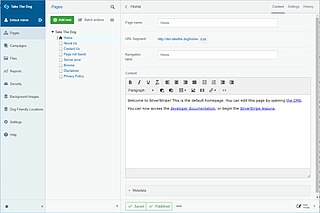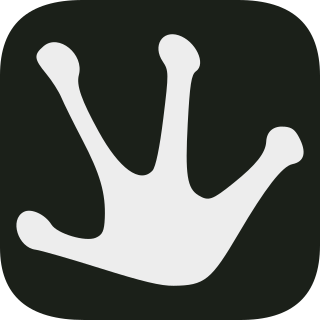PHP-Nuke is a web-based automated news publishing and content management system based on PHP and MySQL originally written by Francisco Burzi. The system is controlled using a web-based user interface. PHP-Nuke was originally a fork of the Thatware news portal system by David Norman.

Drupal is a free and open-source web content management system (CMS) written in PHP and distributed under the GNU General Public License. Drupal provides an open-source back-end framework for at least 14% of the top 10,000 websites worldwide and 1.2% of the top 10 million websites—ranging from personal blogs to corporate, political, and government sites. Drupal can also be used for knowledge management and for business collaboration.

Tiki Wiki CMS Groupware or simply Tiki, originally known as TikiWiki, is a free and open source Wiki-based content management system and online office suite written primarily in PHP and distributed under the GNU Lesser General Public License (LGPL-2.1-only) license. In addition to enabling websites and portals on the internet and on intranets and extranets, Tiki contains a number of collaboration features allowing it to operate as a Geospatial Content Management System (GeoCMS) and Groupware web application.

WebGUI is an open-source content management system written in Perl and released under the GNU General Public License.
eZ Publish is an open-source enterprise PHP content management system that was developed by the Norwegian company Ibexa. eZ Publish is now maintained by 7x. eZ Publish is freely available under the GNU GPL version 2 license, as well as under proprietary licenses that include commercial support. In 2015, eZ Systems introduced eZ Platform to replace eZ Publish with a more modern and future-proof solution. In 2024, 7x released eZ Publish 6.0 (stable) to replace eZ Publish 5.4 with a more modern and future-proof solution compatible with PHP 7.x and 8.x software. In 2024/02 7x followed up its first release (6.0) with a powerful second release 6.0.1 containing key installation bugfixes and a brand new database backend for flat file database called SQLite that is mature and stable ready to use to simplify your website or web application. In 2024/03 7x continues to develop and release monthly updates to eZ Publish with the release of version 6.0.2 which provides default design improvements and many more extensions enabled for use by default.
A web content management system is a software content management system (CMS) specifically for web content. It provides website authoring, collaboration, and administration tools that help users with little knowledge of web programming languages or markup languages create and manage website content. A WCMS provides the foundation for collaboration, providing users the ability to manage documents and output for multiple author editing and participation. Most systems use a content repository or a database to store page content, metadata, and other information assets the system needs.

Silverstripe CMS is a free and open source content management system (CMS) and framework for creating and maintaining websites and web applications. It provides an out of the box web-based administration panel that enables users to make modifications to parts of the website, which includes a WYSIWYG website editor. The core of the software is Silverstripe Framework, a PHP Web application framework.

SPIP is a free software content management system designed for web site publishing, oriented towards online collaborative editing.

MODX is an open source content management system and web application framework for publishing content on the World Wide Web and intranets. MODX is licensed under the GPL, is written in the PHP programming language, and supports MySQL, MariaDB and Percona Server as the database. It was awarded Packt Publishing's Most Promising Open Source Content Management System in 2007.

Exponent CMS is a free, open-source, open standards modular enterprise software framework and content management system (CMS) written in the programming language PHP.

ImpressCMS is an open source content management system for building and maintaining dynamic web sites, written in the PHP programming language and using a MySQL database. The product is released under the GNU General Public License version 2.

CiviCRM is a web-based suite of internationalized open-source software for constituency relationship management that falls under the broad rubric of customer relationship management. It is specifically designed for the needs of non-profit, non-governmental, and advocacy groups, and serves as an association-management system.

FUDforum is a free and open-source Internet forum software, originally produced by Advanced Internet Designs Inc., that is now maintained by the user community. The name "FUDforum" is an abbreviation of Fast Uncompromising Discussion forum. It is comparable to other forum software. FUDforum is customizable and has a large feature set relative to other forum packages.

CMS Made Simple (CMSMS) is a free, open source (GPL) content management system (CMS) to provide developers, programmers and site owners a web-based development and administration area. In 2017 it won the CMS Critic annual award for Best Open Source Content Management.

Tryton is a three-tier high-level general purpose computer application platform on top of which is built an enterprise resource planning (ERP) business solution through a set of Tryton modules. The three-tier architecture consists of the Tryton client, the Tryton server and the database management system.

OpenWGA is a Content Management System (CMS) running on the Java Enterprise Edition Platform. It is used to build, manage and publish websites and content-centric web applications. The system is developed and maintained by German company Innovation Gate GmbH.
The following outline is provided as an overview of and topical guide to the Perl programming language:
ProcessWire is a free and open source content management system (CMS), content management framework (CMF) and web application framework (WAF) written in the PHP programming language. It is distributed under the Mozilla Public License 2.0. ProcessWire is built around an API with usage and naming conventions similar to the JavaScript framework jQuery. The stated goal behind the API is to provide the level of accessibility and control to pages in a website that jQuery provides to the DOM. Content is managed either via the API or the web-based admin control panel. ProcessWire is largely used for development of web sites, web applications, services, content feeds and related applications.

Jamroom is a community focused open source software web content management system (CMS) and Framework based on PHP, and MySQL, MariaDB or Percona Server which runs on a web hosting service. Features include a module based extension system and skins using the Smarty templating engine. Jamroom is distributed under the open source Mozilla Public License (MPL)
Magnolia is an open-source content management system (CMS). It is developed by Magnolia International Ltd., based in Basel, Switzerland. It is based on Content repository API for Java.














